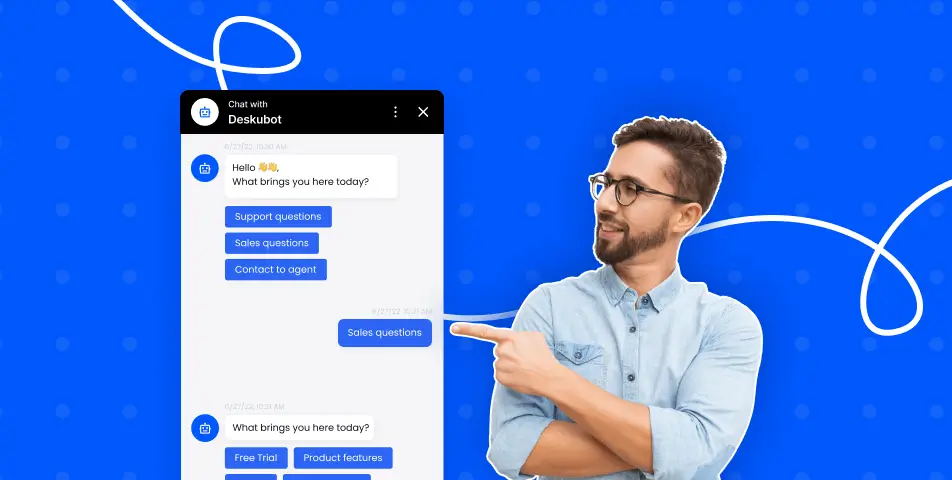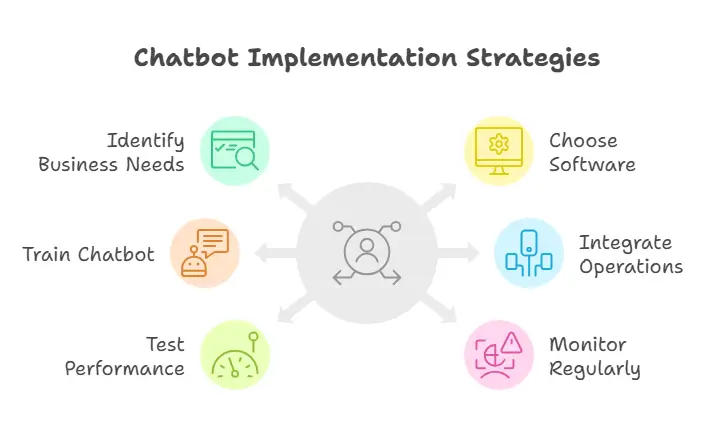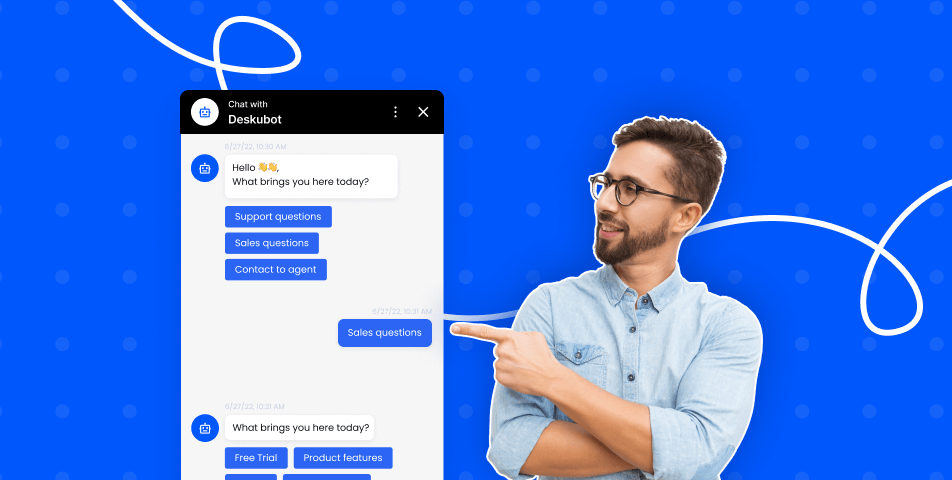Chatbots for customer service are transforming how businesses manage customer interactions. By offering self-service options, answering customer queries, and engaging website visitors 24/7, they enhance the customer service experience and build better customer relationships.
For e-commerce businesses, SaaS companies, and customer service teams, adopting AI-powered chatbots improves customer satisfaction, reduces operational costs, and supports customer service agents. Thanks to natural language processing and machine learning, these tools deliver personalized responses, tackle complex customer inquiries, and provide consistent support across digital channels.
This guide will break down what customer service chatbots are, how they work, and how to use them to improve customer engagement and streamline customer service processes.
What Are Customer Service Chatbots?

A customer service chatbot is a virtual assistant powered by artificial intelligence that helps businesses manage customer interactions. These chatbots are designed to handle customer queries, provide self-service options, and offer accurate responses on multiple channels, such as messaging apps, social media platforms, and websites.
Chatbots generally fall into two categories:
- Rule-based chatbots: These rely on predefined scripts and workflows to answer routine inquiries or perform basic tasks.
- AI-powered chatbots: Equipped with advanced natural language processing and machine learning, these chatbots understand complex customer questions, adapt to customer context, and even simulate human conversations.
With seamless integration into CRM systems and customer service platforms, chatbots assist support agents by tackling repetitive tasks and freeing them to focus on more complex issues. They also provide consistent support to improve the overall customer experience.
For example, an AI customer service bot can assist with routine tasks like answering frequently asked questions, tracking orders, or scheduling appointments. This level of automation not only reduces response times but also helps customer service teams provide personalized customer service efficiently.
Benefits of Using Chatbots in Customer Service
Adopting chatbots for customer service offers businesses a wide range of advantages, helping them streamline customer interactions and improve the overall customer service experience.
1. 24/7 Availability and Faster Response Times
Customer service chatbots ensure consistent support by being available outside regular business hours. They respond instantly to customer queries, reducing waiting times and addressing inquiries with just a few clicks.
2. Cost Savings and Scalability
Using AI-powered chatbots for routine tasks like answering frequently asked questions or providing order updates significantly lowers operational costs. Unlike human support agents, chatbots can manage multiple conversations simultaneously, making them a cost-effective solution for growing businesses.
3. Improved Customer Satisfaction and Engagement
With natural language processing, chatbots deliver personalized responses and adapt to the unique customer journey. This enhances customer engagement, fosters customer loyalty, and builds better customer relationships.
4. Efficient Support for Human Agents
By handling repetitive and low-priority customer inquiries, chatbots free up human support agents to focus on complex issues. This improves team efficiency and ensures a better balance between automation and human interactions.
5. Multilingual and Omnichannel Support
Modern chatbots offer multilingual support, making it easier to cater to diverse audiences. They integrate seamlessly across messaging platforms, social media platforms, and other digital channels, ensuring smooth customer communication regardless of the channel.
6. Valuable Data Collection
Chatbots gather direct user feedback and provide insights into common customer questions or issues. Businesses can use this valuable data to improve services, optimize processes, and enhance the customer experience.
How to Implement Chatbots in Your Business

Integrating chatbots for customer service into your operations requires careful planning to ensure they align with your business goals and enhance the customer service experience. Here’s a step-by-step approach:
1. Identify Your Business Needs
Start by analyzing your customer service processes. Determine where chatbots can make the most impact—whether it’s answering frequently asked questions, providing self-service options, or supporting customer service teams with routine inquiries.
2. Choose the Right Chatbot Software
Selecting the right customer service chatbot software is critical. Look for solutions that offer:
- Advanced natural language processing to understand customer context.
- Integration with CRM systems and customer service platforms.
- Multilingual capabilities for global reach.
- Options to support human agents when handling complex customer questions.
3. Train Your Chatbot with Relevant Data
Use existing customer inquiries and feedback to train the chatbot. This ensures the bot understands common issues and delivers accurate responses. Incorporate machine learning so it improves over time with real interactions.
4. Integrate Seamlessly into Your Operations
Connect the chatbot to your messaging apps, social media platforms, and website. This ensures customers can engage with the bot across multiple channels, enhancing their customer journey.
5. Test and Refine Performance
Before a full launch, conduct testing to identify areas where the chatbot may fall short. Monitor its ability to handle routine tasks, provide personalized responses, and transition seamlessly to human support agents when necessary.
6. Monitor and Update Regularly
Post-launch, track the chatbot’s performance using metrics like response times, resolution rates, and user feedback. Regular updates will keep the chatbot aligned with evolving customer needs, improving both customer satisfaction and customer loyalty.
Best Practices for Effective Chatbot Use
To get the most out of chatbots for customer service, businesses must follow a few best practices to ensure smooth implementation and optimal performance.
1. Ensure Seamless Human Handover
No matter how advanced your AI-powered chatbot is, some customer questions require human support agents. Design your system to transition customers to a human customer service agent when dealing with complex issues. This ensures that customer needs are fully met.
2. Update the Chatbot Regularly
Use direct user feedback and data from customer interactions to continually update and refine your chatbot. Keeping the bot’s knowledge base current improves its ability to provide accurate responses and boosts customer satisfaction.
3. Maintain Transparency
Let customers know they are interacting with a virtual assistant. Be upfront about the chatbot’s capabilities and limitations. This sets clear expectations and enhances customer trust.
4. Focus on Personalization
Leverage natural language understanding to offer personalized responses that match the customer’s unique needs and preferences. Use data from CRM systems to tailor interactions and build better customer relationships.
5. Optimize for Multichannel Support
Integrate your chatbot across multiple channels, such as messaging platforms, social media platforms, and your website. This ensures consistent support and helps businesses engage with customers wherever they are.
6. Balance Automation with Human Touch
While chatbots handle routine tasks efficiently, they should complement, not replace, human interactions. A balanced approach improves the overall customer service experience.
7. Measure and Monitor Performance
Track key performance metrics like response times, resolution rates, and customer feedback. These insights help improve the chatbot’s performance and identify areas for enhancement.
By following these practices, businesses can use AI-powered chatbots to improve customer engagement, reduce operational costs, and enhance the customer journey.
Challenges and Considerations
While chatbots for customer service offer numerous benefits, implementing them effectively requires addressing certain challenges. Here are some common hurdles businesses face and how to overcome them.
1. Understanding Limitations of AI
Even the most advanced AI-powered chatbots may struggle with nuanced or highly complex customer questions. Relying too much on automation without planning for human interactions can lead to frustration.
Solution: Ensure a seamless handoff to human agents for issues that require deeper understanding or empathy.
2. Balancing Automation with Personalization
While chatbots can handle routine tasks, they might lack the emotional intelligence needed for personalized customer service.
Solution: Use natural language understanding and CRM integration to deliver tailored responses while maintaining the option for human support agents to step in when necessary.
3. Integrating Across Multiple Channels
Providing consistent support on multiple channels, such as messaging apps, websites, and social media platforms, can be complex.
Solution: Choose a customer service chatbot software that offers easy seamless integration with your existing customer service platform and digital channels.
4. Customer Acceptance and Trust
Some customers may be hesitant to engage with a virtual assistant, especially if they are unaware of the bot’s capabilities.
Solution: Be transparent about the chatbot’s role, and clearly communicate when a human customer service agent will take over if needed. This builds trust and enhances the customer experience.
5. Maintaining Accuracy and Relevance
Without regular updates, chatbots may provide outdated or inaccurate responses, leading to dissatisfaction.
Solution: Continuously monitor performance and use direct user feedback to refine the chatbot’s knowledge base, ensuring it stays up-to-date.
6. Security and Privacy Concerns
Handling sensitive customer data through chatbots raises security and privacy issues.
Solution: Implement robust data encryption and follow compliance standards to protect customer communication and maintain trust.
7. High Initial Setup Costs
Developing and deploying an effective chatbot, especially one with advanced natural language processing, can require significant investment.
Solution: Start small with targeted applications, such as answering routine inquiries, and scale gradually as the ROI becomes evident.
By addressing these challenges, businesses can use AI customer service bots effectively, improving customer satisfaction while optimizing customer service processes.
Future Trends in Chatbot Technology
The evolution of AI-powered chatbots is reshaping the way businesses interact with their customers. Here are some emerging trends that will define the future of customer service chatbots:
1. Advanced AI and Machine Learning
Future chatbots will utilize more sophisticated natural language processing and machine learning algorithms. These advancements will improve their ability to understand customer context, deliver personalized responses, and simulate human conversations with greater accuracy.
2. Voice-Powered Chatbots
The rise of voice assistants is driving demand for voice-enabled chatbots. Businesses will use this technology to engage customers in conversational interactions across messaging apps and digital channels.
3. Deeper CRM Integration
Future customer service chatbot software will integrate more deeply with CRM systems, enabling bots to access real-time customer data and provide contextual assistance.
4. Hyper-Personalization
Chatbots will leverage predictive analytics to offer highly customized support, enhancing customer relationships and driving customer loyalty.
5. Proactive Assistance
Chatbots will move beyond reactive support by proactively reaching out to customers with relevant offers, updates, or reminders, enhancing the customer journey.
6. Enhanced Multilingual Capabilities
Chatbots with multilingual support will become more robust, making it easier for businesses to serve diverse audiences.
These trends promise to make AI customer service bots even more valuable, helping businesses engage customers more effectively and improve their customer service experience.
Conclusion
Chatbots for customer service are revolutionizing how businesses interact with their customers. By automating routine tasks, improving customer communication, and reducing operational costs, they allow customer service teams to focus on complex customer inquiries and enhance overall efficiency.
For businesses looking to adopt AI-powered chatbots, understanding their functionality, benefits, and challenges is the first step. When implemented thoughtfully, chatbots can deliver personalized customer service, enhance customer satisfaction, and foster better customer relationships. With advancements in natural language processing and machine learning, the potential of chatbots in improving the customer journey is limitless.
FAQs About Chatbots for Customer Service
1. How do chatbots improve customer service?
By automating routine inquiries, offering 24/7 consistent support, and providing personalized responses, chatbots reduce response times and enhance the customer service experience.
2. Can chatbots handle complex customer issues?
While chatbots excel at routine tasks, they hand over complex issues to human customer service agents for resolution, ensuring the best outcomes for customers.
3. What industries benefit most from customer service chatbots?
Industries like e-commerce, SaaS, hospitality, and financial services see significant benefits, as chatbots streamline customer interactions across multiple channels.
4. How do chatbots use natural language processing?
Chatbots with natural language processing understand and interpret customer questions, allowing them to provide accurate and contextually relevant answers.
5. Are chatbots secure for handling sensitive customer data?
Yes, most customer service chatbot software follows stringent security protocols and compliance standards to ensure data privacy and protection.


